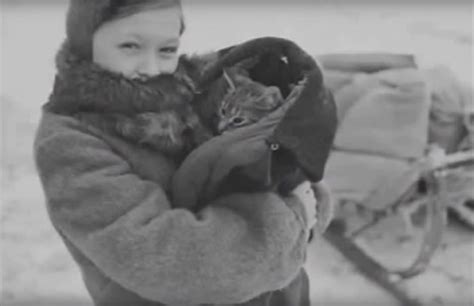
Masha, in her fur, so worn, with Vaska,
prize, from chaos born, sweet breadwinner found,
amongst the rubble, ragged, mewling hard,
the ghost of hunger feasts on all, the cat,
a god of days before, with eyes aglow,
in his haunting dance, Masha dreams; "Mamma
the world’s on fire!”, she pleads, as slumber,
wraps around her needs, child of war doesn’t,
recall much of what went before.
Vaska, the hunter, fierce and true, he fights
for two, in darkest hours, mice skitter
through a hollow home. Leningrad ‘41
dead bodies on sledges, trudging, ice holes,
hordes of rats that Vaska deters with teeth
displays whose in control.
Natalya, listens out with care, the spark,
of life they share; “Come, Masha”, she gently pulls,
as dreams disperse, deadly wakefulness calls,
with their Vaska safely tucked underarm
Natalya thinks he'll come to no harm
as sirens wail, they flee, worn, hand in hand,
in shadows cast by famine’s clasp, hunger
sings its mournful hymn.
Everyday now Masha collects crumbs,
for spring will soon summon hopeful sparrows,
and from their flight, lives restored, together,
like the sun breaking through after heavy rain
they dance through unsung days,
a leap, a catch, a fragile feast,
from her friend life was drawn,
when peace returned, the world awoke,
Vaska was gifted the finest bite,
she buried him where the soft stones lay,
for he bore warmth through winter’s trial,
more than a cat—family’s fate,
now nestled together in ground they claim,
with Vaska close, they find their peace,
through bonds of love, they’re always home,
sharing prey, two survivors,
her prize from chaos born.
.
This poem was inspired by the the account of what is known as the Leningrad Cat who kept his two owners alive in the siege catching mice, rats and birds. His story is kept alive in Russian museums today as a symbol of hope and resilience.
Top-notch exposition uses descriptive imagery as a concept.
Another one that I found interesting was the theme.
Greetings.